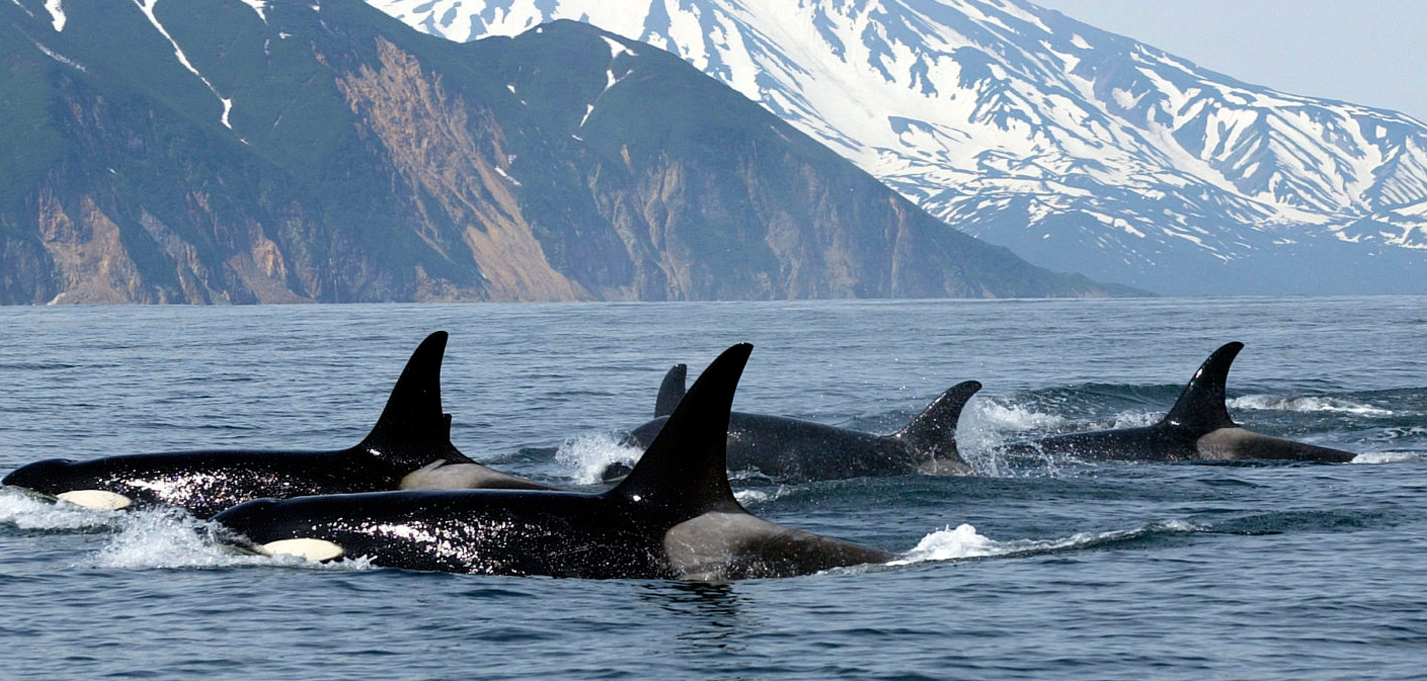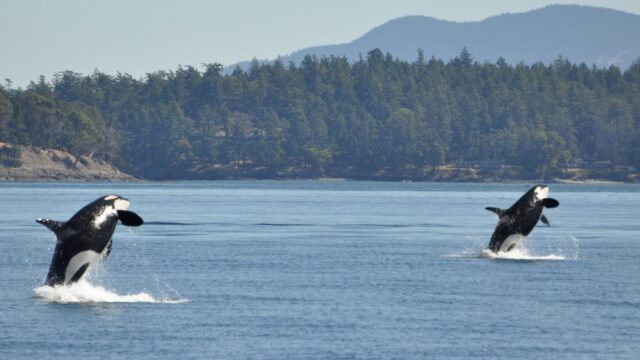UPDATE (Jan. 31, 2018): Join our fight to protect Southern Resident killer whales. Take action today by urging Minister of Fisheries and Oceans Dominic LeBlanc and Minister of Environment and Climate Change Catherine McKenna to recommend an emergency order to protect this endangered population.
We’ve worked with conservation groups for more than ten years to protect British Columbia’s resident killer whales, which are at risk from pollution, diminishing salmon runs, and noise from increased vessel traffic.
Now, we’re gearing up for another major battle in our fight to protect the Southern Resident killer whale.
In October, we’ll be in court over Cabinet’s approval of the proposed Kinder Morgan Trans Mountain pipeline. On behalf of our clients Living Oceans Society and Raincoast Conservation Foundation, we’re arguing that Cabinet’s decision was based on a flawed NEB report, which failed to account for threats that increased tanker traffic pose to the already endangered Southern Resident killer whales — despite recent research showing that the population has declined from 82 whales at the time of the NEB hearing to only 76.
Which is why when the federal government launched a public engagement website just two months before the hearing, something didn’t feel right.
The “Let’s Talk Whales” site invited the public to share ideas for how to protect endangered Southern Resident killer whales, North Atlantic right whales, and St. Lawrence Estuary belugas.
But while the government claims that it wants to hear Canadians’ opinions on how to protect whales, Cabinet’s approval of the Kinder Morgan project suggests “Let’s Talk Whales” is far too little, too late.
The government’s poorly-timed campaign to crowd-source solutions from concerned, but non-expert Canadians is yet another example of how it’s failing to take real action to prevent threats to the Southern Resident killer whale. And while it’s easy to find these tactics discouraging, whenever we pause to reflect on these animals, we’re motivated to continue fighting to protect them.
Here we share a few orca facts that inspire our fight to protect the Southern Resident killer whales living along the Pacific Coast:
Orca origins
Scientists agree that cetaceans evolved from four-legged terrestrial animals. Recent fossil evidence links them to a coyote-like animal that walked the earth around 50 million years ago.
Go back another 120 million years and our own evolutionary path converges with the orca. Our common ancestor is a skinny, shrew-like insectivore — the precursor of all modern mammals.
We have a lot in common with orcas. Like us, they give birth and nurse their young. They also have lungs and breathe air.
Synchronized breath
Despite being air-breathing mammals, orcas spend at least 90 per cent of their lives under water, and can do so because nature equipped them to live between two realms.
Orcas can slow their heart beat to conserve oxygen, and store it in their muscles and body fluids for later use. If oxygen is in short supply, it’s automatically redirected to the heart, brain, and swimming muscles, where it’s needed most.
There’s also a remarkable social quality to orca breathing. Orcas coordinate respiration when resting, foraging, and travelling together.
Genetic Distinction
Orcas inhabit all the world’s oceans. While they’re sometimes considered a single species, scientific research has revealed genetically distinct ecotypes — including resident, transient and offshore — that have evolved complex cultures stemming from dietary preferences.
Fish-eating residents, like B.C.’s Southern Resident population, inhabit specific geographic regions where food is abundant. This lifestyle likely gave rise to their complex social structures and rich vocal communication.
Matriarchal societies
Resident killer whales have unique social structures defined by maternal genealogy. They live in tight-knit family units made up of a mother, her offspring, and her daughters’ offspring.
A son remains with his mother for a lifetime, and a daughter will too, although sometimes she parts with her offspring to meet their needs. When a daughter forms a new matrilineal line, the family unit stays closely connected to the pod.
A pod refers to matrilineal groups that have a recent, common maternal ancestor. The oldest living female holds vast knowledge about the pod’s travel routes and feeding grounds. As knowledge-keeper, the matriarch guides and teaches her family members, who in turn rely on her for their survival. Orcas are one of three animals — pilot whales and humans the other two — that experience menopause.
Echolocation
Orcas use their highly-developed sense of hearing to navigate the ocean’s dark waters, where sound travels close to five times faster than in air.
They emit high-pitched sounds and clicks that bounce off objects in their path generating faint echoes. From these rebounding sounds they can discern a marine object’s shape, size, texture, and speed. Echolocation is how Southern Resident killer whales identify their preferred prey — large, fatty Chinook salmon.
Vocal communication
Orcas use vocal communication to stay connected with one another.
Researchers have learned that transient, offshore, and resident orcas have distinct, learned vocal patterns. Residents have more calls than transients, and discernible dialects between pods. They also vocalize frequently, and in this way stay closely connected to their family members.
“Let’s (Take Action to Protect) Whales”
The Southern Resident killer whale is a constant reminder of why our work (and your support!) is so important.
The government says it wants ideas for combatting threats from contaminants, entanglements, lack of food availability, underwater noise and vessel traffic. Here’s one suggestion: Don’t approve projects like Kinder Morgan that will lead to massive increases in oil tanker traffic in endangered orca habitat, with no measures in place to mitigate its effects.
UPDATE (Jan. 31, 2018): Take action to protect Southern Resident killer whales. Send a letter to Minister of Fisheries and Oceans Dominic LeBlanc and Minister of Environment and Climate Change Catherine McKenna, urging them to recommend an emergency order to protect this endangered population.
UPDATE (May 2024): The “Let’s Talk Whales” website is no longer active.




